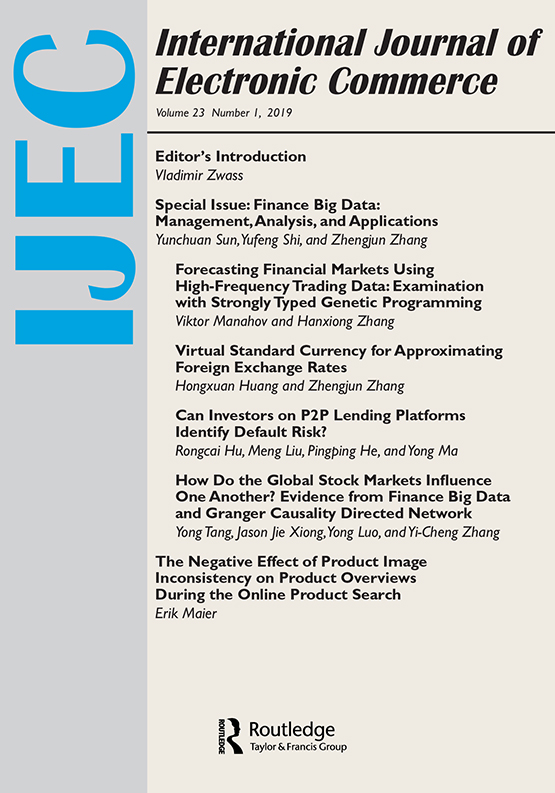Why Can’t I Stop Using Social Media Problematically? The Impact of Norm and Neutralization from the Regulatory Focus Perspective
IF 3.8
3区 管理学
Q2 BUSINESS
International Journal of Electronic Commerce
Pub Date : 2021-04-03
DOI:10.1080/10864415.2021.1887698
引用次数: 5
Abstract
ABSTRACT Problematic social media use has increasingly become an issue in schools and companies. Individuals often attempt to reduce their problematic use, but some may not be successful. This implies that there are both impeding and maintaining factors influencing problematic use and that different individuals may follow different mechanisms during problematic use. Drawing on cognitive dissonance theory and regulatory focus theory, our study develops a theoretical model to describe how impeding factors (here, injunctive norms) and maintaining factors (neutralization) influence individuals’ intention to reduce problematic use through guilt, as well as how the effects of these factors are moderated by individuals’ regulatory focus. The results provide strong support for our model. While injunctive norms have a stronger effect on prevention-focused users, the effect of neutralization is stronger on promotion-focused users. Our study highlights the importance of regulatory focus to our understanding of the differential impact of injunctive norms and neutralization and suggests that future studies further examine how individuals experience cognitive dissonance following different mechanisms. Our results suggest that when trying to reduce students’ problematic social media use, teachers need to follow different approaches for individuals with different types of regulatory focus.为什么我不能停止使用社交媒体有问题?监管焦点视角下的规范与中立的影响
摘要社交媒体使用问题日益成为学校和公司的一个问题。个人经常试图减少有问题的使用,但有些可能并不成功。这意味着影响有问题使用的因素既有阻碍因素,也有维持因素,不同的人在有问题使用期间可能遵循不同的机制。基于认知失调理论和调节焦点理论,我们的研究开发了一个理论模型来描述阻碍因素(这里是禁令规范)和维持因素(中和)如何影响个人通过内疚减少问题使用的意图,以及这些因素的影响如何由个人的调节焦点调节。结果为我们的模型提供了有力的支持。禁令规范对以预防为重点的用户有更强的作用,而对以推广为重点的使用者则有更强的中和作用。我们的研究强调了监管重点对我们理解禁令规范和中和的不同影响的重要性,并建议未来的研究进一步研究个体如何在不同机制下经历认知失调。我们的研究结果表明,在试图减少学生有问题的社交媒体使用时,教师需要对具有不同类型监管重点的个人采取不同的方法。
本文章由计算机程序翻译,如有差异,请以英文原文为准。
求助全文
约1分钟内获得全文
求助全文
来源期刊

International Journal of Electronic Commerce
工程技术-计算机:软件工程
CiteScore
7.20
自引率
16.00%
发文量
18
审稿时长
>12 weeks
期刊介绍:
The International Journal of Electronic Commerce is the leading refereed quarterly devoted to advancing the understanding and practice of electronic commerce. It serves the needs of researchers as well as practitioners and executives involved in electronic commerce. The Journal aims to offer an integrated view of the field by presenting approaches of multiple disciplines.
Electronic commerce is the sharing of business information, maintaining business relationships, and conducting business transactions by digital means over telecommunications networks. The Journal accepts empirical and interpretive submissions that make a significant novel contribution to this field.
 求助内容:
求助内容: 应助结果提醒方式:
应助结果提醒方式:


